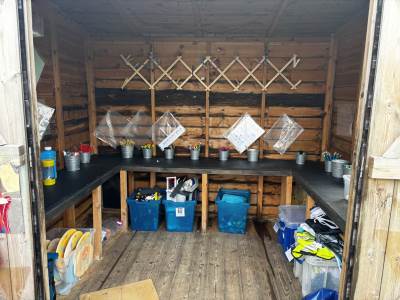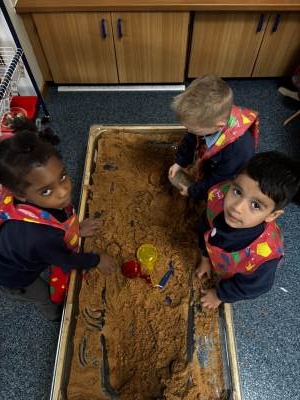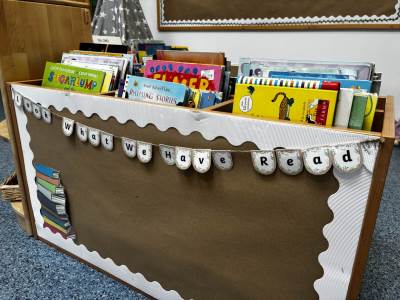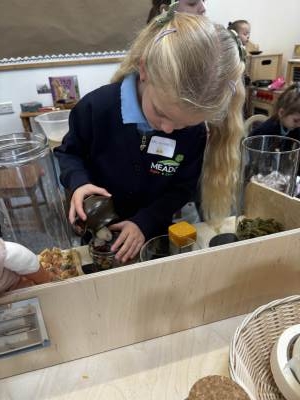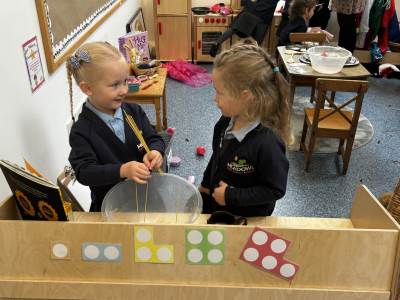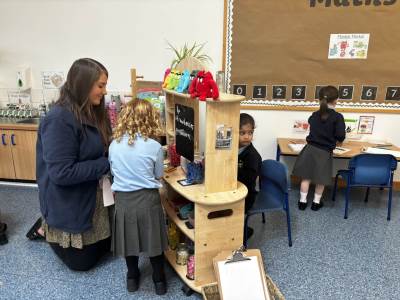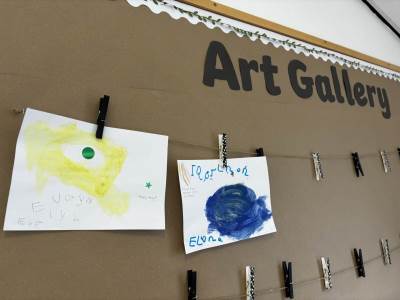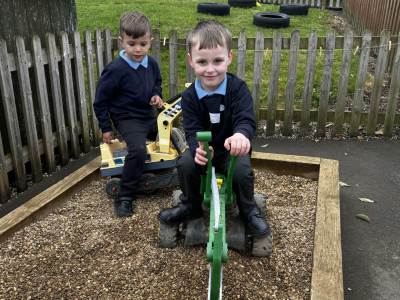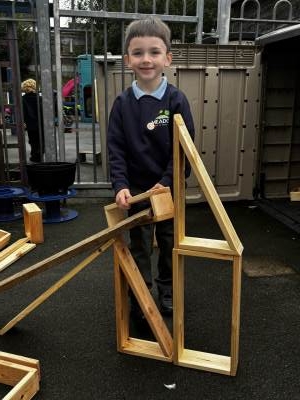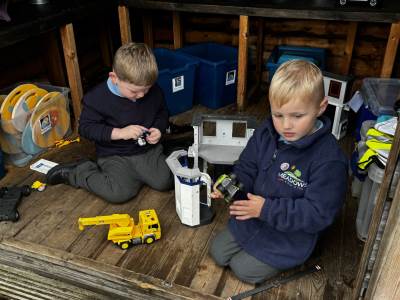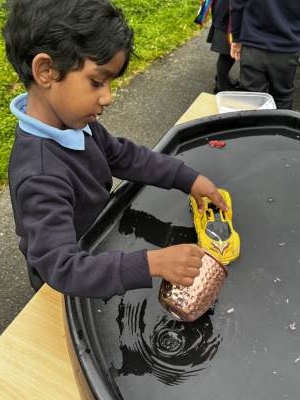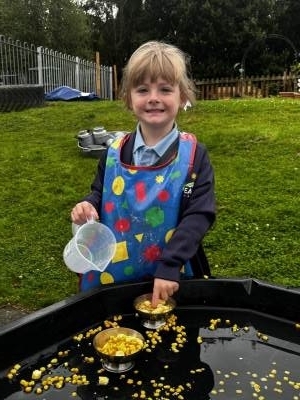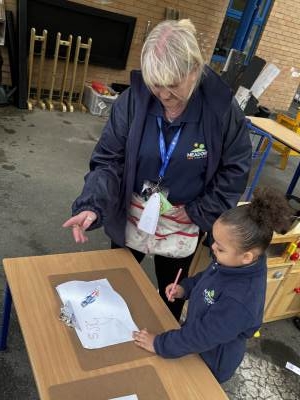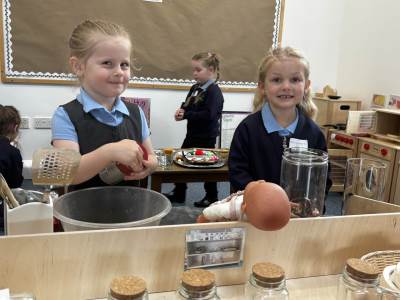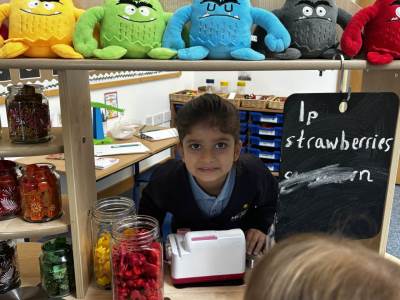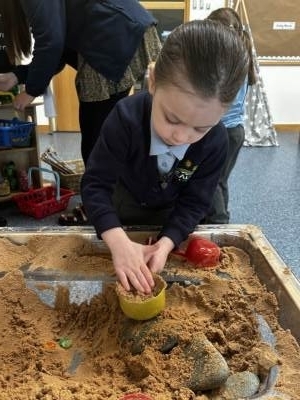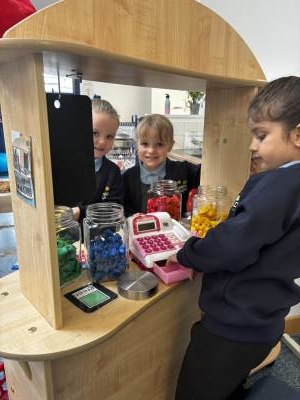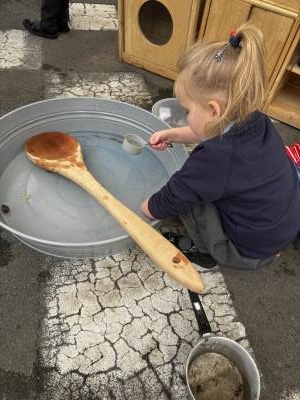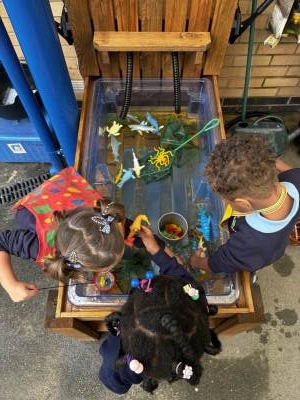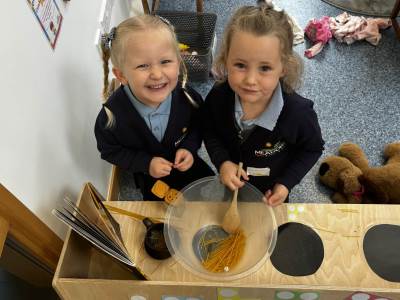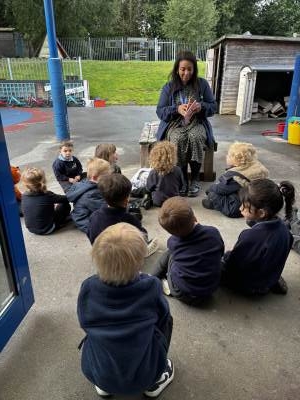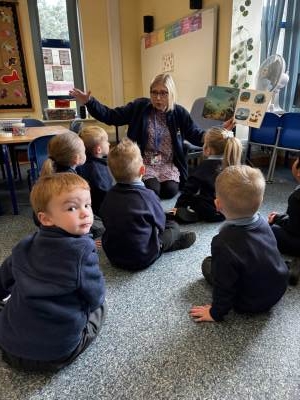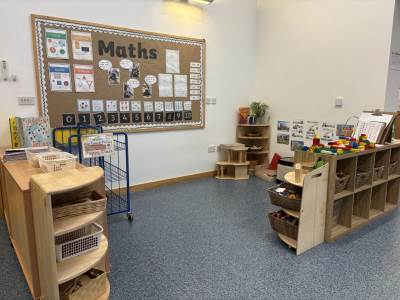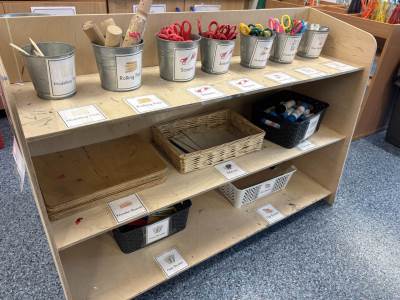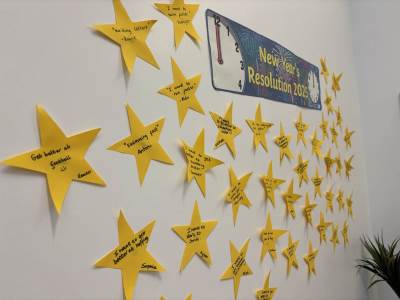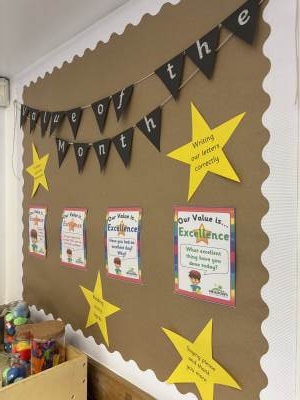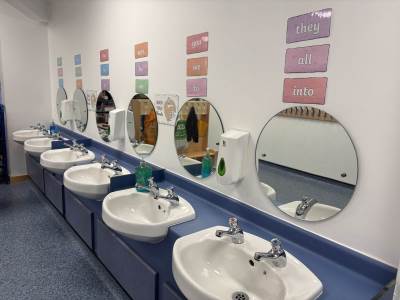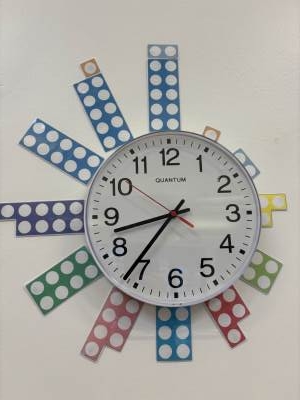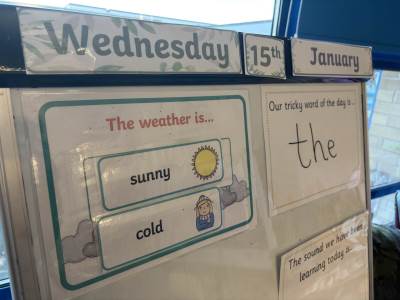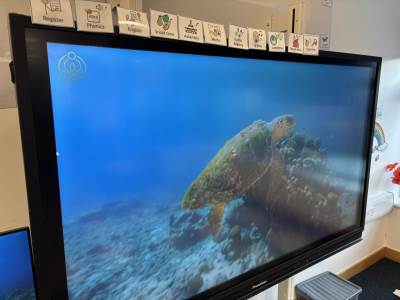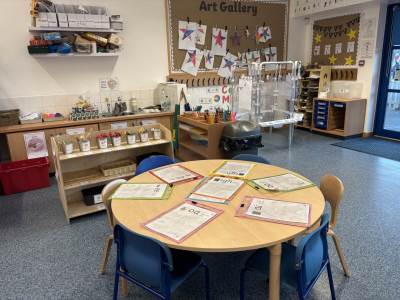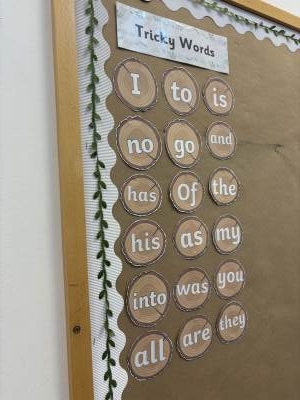Early Years Foundation Stage
"The first five years have so much to do with how the next 80 turn out." ~ Bill Gates
At Meadows Primary School and Nursery, we are exceptionally proud of our 32 place Nursery and 60 place Reception provision.
In their early years, children develop quickly and a child's experiences between birth and five have a major impact on their future life chances. A secure, safe and happy Early Years experience is therefore vital to their educational success.
At Meadows, our commitment to ensuring all of our youngest children and their families are enabled to aspire, grow and flourish.
We pride ourselves on having a strong partnership with parents and carers which provides the foundation that children need to make the most of their abilities and talents as they grow up. Through our values-based education we develop and nurture strong positive attitudes where children become proud and respectful of themselves, others and their environment
Life in EYFS
A Day in the Life of Reception
Although no day is ever the same in Reception, we are delighted to keep the children busy with a timetable of opportunity for learning. A general day looks as follows:
|
8.40 - 8.50 |
Good Morning time! |
|
8.50 – 9.10 |
Phonics |
|
9.10 – 9.30 |
Writing |
|
9.30-9.40 |
Dough Disco |
|
9:40-10.25 |
Topic Time |
|
10.25 – 10.45 |
Snack and Story |
|
10.45-10.50 |
Movement Break |
|
10.50-11.10 |
Guided Reading |
|
11.10-11.50 |
P.E / RE / PSHE |
|
11.50-11.55 |
Rhyme Time |
|
11.55 -12.45 |
Lunch Time |
|
12.45-12.55 |
Calming Time & Afternoon Register |
|
12.55 – 1.15 |
Phonics |
|
1.15 – 1.45 |
Maths |
|
1.45-2.55 |
Topic Time |
|
2.55 - 3.00 |
Home Readiness |
|
3.00 - 3.10 |
Golden Read |
Our P.E. Days this school year are on Monday and Thursday.
Click here to find out about our uniform.
Our Staff Team
We are proud of our passionate, experienced and positive practitioners in EYFS. Our team are here to partner with you in enabling your child to aspire, grow and flourish. You will get to know them quickly and we encourage you to engage with them. When schools and families work together, amazing things can happen.
Our EYFS Curriculum
We follow the curriculum as outlined in the 2024 Statutory Framework for the EYFS. The EYFS framework includes seven areas of learning and development that are equally important and interconnected.
The prime areas are: Communication and Language, Physical Development, and Personal, Social and Emotional Development. The prime areas are strengthened and applied through four specific areas: Literacy, Mathematics, Understanding the World and Expressive Arts and Design.
 In EYFS, our staff plan and activities for children that enable them to develop and learn effectively. The individual needs, interests and stage of development of each child is taken into account to plan a challenging and enjoyable experience for all. Each area of learning is planned for through a mixture of adult led and child-initiated interactions.
In EYFS, our staff plan and activities for children that enable them to develop and learn effectively. The individual needs, interests and stage of development of each child is taken into account to plan a challenging and enjoyable experience for all. Each area of learning is planned for through a mixture of adult led and child-initiated interactions.
"Children need the freedom and time to play. Play is not a luxury. Play is a necessity." ~ Kay Redfield Jamison
Well-planned play takes the majority of our school day. It gives children opportunities to practise using their knowledge and skills to:
- explore and make sense of the world around them
- learn to focus their attention
- learn to communicate and cooperate with others
At Meadows, we think carefully about play-based learning and the role of the adult. For example, we plan and prepare resources for play that reflect children’s differing knowledge and broaden their interests. Through their interactions, adults help children name new objects and thoughtfully explore resources, they develop children’s language, extend their vocabulary and introduce them to knowledge of the world.
Nursery Long Term Plan for 2 to 3 Year Olds
Nursery Long Term Plan for 3 to 4 Year Olds
Our Principles of Pedagogy
The guiding principles of pedagogy within our EYFS aim to ensure that children have a safe, supportive, and stimulating environment to explore, learn, and grow. The team emphasise a holistic approach to early childhood education, focusing on the development of the whole child.
- Unique Child: Every child is a unique individual who is constantly learning and can be resilient, capable, confident, and self-assured.
- Positive Relationships: Children learn to be strong and independent through positive relationships. A secure, loving, and nurturing environment is essential for their development and is a beacon of our EYFS practice.
- Enabling Environments: An environment that is stimulating and rich in opportunities helps children learn and develop. Practitioners provide activities and resources that are appropriate for each child's stage of development and interests.
- Learning and Development: Children develop and learn in different ways and at different rates. We ensure education and care of all children in our early years provision, including children with special educational needs and disabilities.
Our definition of ‘teaching’ in the early years is broad. It covers the many different ways in which adults help young children to learn, including:
- interacting with children during planned and child-initiated play and activities
- communicating and modelling language
- showing, explaining and exploring ideas
- encouraging, questioning, recalling and providing a narrative for what children are doing
- setting challenges and helping children to achieve them
- paying attention to the physical environment and resources, as well as the daily structures and routines that establish expectations
Understanding our Terminology
There are a wealth of phrases and language we use in school that we want you to understand. We hope these simple explanations help!
- Teacher - all adults in our Early Years Foundation Stage are known as Teachers. A teacher guides, supports, and inspires children, facilitating learning and development through engaging and meaningful educational experiences. This is all of our fantastic EYFS Team!
- Dough Disco - a fun and engaging activity designed to develop fine motor skills in young children. It involves using play dough to perform various hand and finger exercises in time to music. Children might roll, squeeze, flatten, and shape the dough, which helps strengthen their hand muscles and improve coordination
- Phonics - Phonics is a method of teaching reading by linking sounds (phonemes) with letters or groups of letters (graphemes), helping children decode (read) words
- Maths - In the Early Years Foundation Stage, Maths focuses on developing children’s understanding of numbers, patterns, shapes, space, and measures. It aims to build a strong foundation in mathematical concepts through playful and practical activities. Children learn to count, recognise numbers, and understand basic mathematical ideas like addition and subtraction. Children also explore shapes, sizes, and patterns, which helps them develop spatial awareness and problem-solving skills
- RE - Religious Education (RE) in the Early Years Foundation Stage introduces young children to the concepts of religion and belief through exploration of special people, books, times, places, and objects. It is not a statutory requirement for nursery classes but can be a valuable part of the educational experience. Religious Education helps children understand different cultures and beliefs, fostering respect and tolerance. Activities the children enjoy with their teachers in RE include storytelling, role play, and discussions about festivals and traditions
- PSHE - We follow the 3D PSHE Curriculum which is designed to support children’s personal, social, and emotional development. It includes 25 story-based lessons that align with the Early Learning Goals, focusing on key areas such as making relationships, self-confidence, and managing feelings and behaviour. The curriculum uses engaging stories and characters to teach important values and skills, helping children learn about sharing, personal hygiene, e-safety, and more1. It aims to build a foundation for healthy, confident individuals who can navigate social situations effectively.
- PE - Physical Education (PE) focuses on developing children’s physical skills through fun and engaging activities. It includes both gross motor skills (like running, jumping, and climbing) and fine motor skills (such as threading beads or using scissors). PE activities are designed to promote physical health, coordination, and confidence, often through games, dance, and outdoor play
- Topic Time - Stimulated by our topics and areas of interest, we provide daily periods of extended topic time for our children. This refers to the resources and learning opportunities that are always available to children within our setting, through which children explore, interact, and learn through play at their own pace. The role of teachers in topic time is vital to support and extend children’s learning by following their interests and providing appropriate enhancements to the environment, learning and play. It is for this reason that our adults are 'zoned' - remaining within areas of our provision and ensuring high quality, progressive learning takes place.
How to Support Your Child
Starting school is a huge milestone for your child and for you as a parent! I've read a lot of great things recently about preparing children for making this transition, but what about supporting children throughout their first school year? So much personal development and learning goes on in Reception that is hugely significant for our kids and their futures, so today I'm sharing some simple tips to help you to make it a success.
Why is the first year of school so important?
Of course every year of school is important, however, there is huge special opportunity in a child's first year to shape them as learners and help them develop positive attitudes towards school that will hopefully last throughout their education.
In the first year of school, our children are enabled to lay the important foundations in reading, writing and maths. They will need this for all their future learning. But there's much more to the Reception year than this! A Reception teacher's job is to cultivate the skills and attitudes in children that they will need to be life-long learners. This includes attitudes such as not giving up when they face challenges and being willing to have a go at new activities or experiences. And then there's all the physical, social and emotional development that is also going on in our youngest learner's lives at this time, not to mention needing to adapt to being in a new environment with new routines and expectations.
Here are some top tips for you to support your child in their Reception Year.
1. Help them to settle well.
Children learn best when they feel safe and happy. So in the early weeks of school, try to do everything you can to help make the transition to school smooth. For some children this may be a breeze, but for others they will need a lot of support and empathy to settle well.
If you're one of the parents or carers with tears at the school gate, be assured that most children are fine once their parents or carers leave. Try to keep in mind that this time of separation anxiety will soon pass! Here are a few pointers for helping this transition:
- Children pick up on our anxiety. Be as positive as you can about this exciting new chapter and save your tears until they're out of sight.
- Children thrive on routines and good sleep! Try to stick to a regular bedtime routine. Your child should be getting as close to 12 hours of sleep at this age.
- Having attended our 'Welcome to Reception' evening, share and discuss your child's new, typical daily routine.
- Expect some mood swings and behaviour that is out of character in the early days. Be patient, give them space and this will pass.
- Keep listening and talk through any worries or concerns they might have about school. Reading stories about starting school or stories that touch on common anxieties is a great way of normalising how they are feeling. Stories also act as great conversation starters.
2. Value play.
"Whoever wants to understand much must play much.” - Gottfried Benn
Learning through play is a huge part of the Reception year and for good reason. From improving listening and speaking skills to encouraging creativity and imagination, the benefits of a play-based education are well backed-up by research.
It is in play that children naturally learn- it's what they've been doing from just a few weeks old! Crucially it's where they are most motivated to learn. Play-based learning meets children where they are at and builds on their natural motivation and interests. It's also where kids learn how to learn which will be so important in years to come.
So value the play that they do at school, but also value play at home too. It's easy to get in the habit of just watching television or using devices after school, however, children still need to be encouraged to enjoy time playing. They'll also need to be encouraged to do any home learning set by the school. Keep this playful and fun whenever you can and don't hesitate to speak with a member of the team for support.
3. Learn a little about the curriculum.
You don't need an in-depth knowledge of the curriculum but it helps to know a little bit about what your child will be learning in their first year. That way you'll understand better what your child is working towards and can support their learning at home.
In the UK the curriculum is called the Early Years Foundation Stage and spans the first 5 years of life until the end of the Reception year. Towards the end of Reception your child's class teacher will have to decide if they have met the Early Learning Goals.
As you would expect, the Early Learning Goals cover areas such as reading, writing and learning numbers. But, amongst other things, they also cover physical development, communication and language and personal, social and emotional development. In fact these are known as the prime areas of learning and underpin all the other learning that goes on the classroom.
And running alongside this, teachers are required to work on what are known as the Characteristics of Effective Learning. These are all the important skills and attitudes needed to develop life-long learners.
4. Build concentration skills.
When your child starts school they will be expected to concentrate for short periods of time on the carpet or at a table in a small group. In school, we will build up the expectations for concentration gradually over the year but there will be times when the ability to concentrate is going to be really important.
Children with good concentration skills are more likely to take in their learning and cope with tasks that are more demanding, such as writing.
If your child's ability to concentrate is of concern to you, try to build in times to improve it. After the school day may not be the best time to do this, particularly in the first term when they are likely to be very tired!
Instead, build in time at the weekend to do fun, playful activities that require good concentration such as puzzles, games and listening to audio stories. Studies have shown that screen time actually decreases attention span so try and limit this as much as possible.
Simply going to school, managing all of the new routines and expectations and having the energy to learn is a huge task for a 4 year old. So, where possible, keep their 'out of school life' as simple as possible, especially in the first term. They'll be plenty of time for play dates, clubs and lots of exciting adventures in years to come!
6. Talk to the team!
As a parent or carer, we agree that you will know your child better than anyone else. Don't be afraid to share important information with the class teacher that helps them best care for your child. Even sharing your child's current interests or achievements is helpful so that teachers can make learning even more meaningful for them. We invite you to our 'getting to know you' sessions to support this, but also encourage you to engage with us throughout the school year.
7. Read, read, read!
It goes without saying that learning to read will be a significant focus of your child's first year of school. And it's not an overstatement to say that you have a huge role to play in that. Building in a regular time for your child to practice their reading is so important if they are going to make good progress. Whether that's before school, straight after school or at bedtime, find a time that fits with your family routine and try to stick with it.
In the early days it can be hard to think how to support your child when they can't yet read any words. However, you can find out all about Phonics at Meadows by clicking here.
Try your best not to neglect bedtime stories. Even the most able readers need bedtime stories! It introduces them to new vocabulary and story language and feeds their imagination! It's also a lovely way to re-connect with your child after a busy day.
Good fine motor skills are essential for lots of tasks that children will need to do at school such as doing up zips and buttons and using tools, such as a knife and fork.
One of the biggest fine motor challenges your child will face in their first year is going to be writing. Writing requires so many additional skills so if you can work on developing good fine motor skills and pencil control this will certainly help.
There are lots of fun ways you can improve fine motor skills such as play dough, threading beads or playing with lego.
9. Talk with your child.
Talking about the school day shows your child that you are interested in what's going on in their lives. It also shows them that you value education and school, which encourages them to value it too.
Talking about school also helps you to gain a valuable insight into their day, hear about their achievements but also about any worries or problems that they might be having. Picking up on these challenges early will hopefully mean they can be dealt with before they get too big.
Encouraging your child to talk about their school day can be tricky sometimes. Don't be disheartened if they are reluctant- this is very common! Here are a few tips:
- Try sharing a little about your day first to encourage them to share back.
- Choose a time to talk when they are not distracted by the TV or other devices.
- Try to avoid closed questions that can be answered with a yes or no answer but equally be mindful that 'how was your day?' or 'what did you do today?' are overwhelming questions for some children.
- Ask open, but specific, questions, for example- What was the best thing you did today? What was the hardest thing you did today? Who did you play with today?...Who were you kind to?... Who made you smile?
Starting school brings with it a range of emotions for both children and their parents and it's completely normal to be feeling nervous about it. Be assured that most children do settle well and flourish at school! If you are ever in doubt that you are doing the right thing or have worries or concerns always talk to a member of our team - we are here to help you, as well as your child.

